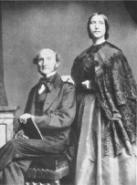
J.S. Mill denounced the legal subjection of women as “wrong in itself” and as “one of the chief hindrances to human improvement” (1869)
About this Quotation:
It was with some excitement that we put online the complete works of John Stuart Mill - all 33 volumes published under the editorship of John Robson for the University of Toronto Press edition. It was a mammoth undertaking which took some decades to complete. What was particularly exciting for us was to be able to use the OLL’s powerful search engine to search for key words and phrases across the whole 32 volumes (the 33rd volume, the index, is online only as a PDF and it not searchable). This quotation is just the first of many from this admirable collection.
Other quotes from this week:
- 2009: John Ramsay McCulloch argues that smuggling is “wholly the result of vicious commercial and financial legislation” and that it could be ended immediately by abolishing this legislation (1899)
- 2008: Confucius edited this collection of poems which contains a poem about “Yellow Birds” who ravenously eat the crops of the local people, thus alienating them completely (520 BC)
- 2004: George Washington on the Difference between Commercial and Political Relations with other Countries (1796)
Other quotes about Women's Rights:
- 2009: Harriet Taylor wants to see “freedom and admissibility” in all areas of human activity replace the system of “privilege and exclusion” (1847)
- 2009: John Stuart Mill uses an analogy with the removal of protective duties and bounties in trade to urge a similar “Free Trade” between the sexes (1869)
- 2006: J.S. Mill in The Subjection of Women argued that every form of oppression seems perfectly natural to those who live under it (1869)
- 2006: J.S. Mill spoke in Parliament in favour of granting women the right to vote, to have “a voice in determining who shall be their rulers” (1866)
- 2005: Mary Wollstonecraft believes that women are no more naturally subservient than men and nobody, male or female, values freedom unless they have had to struggle to attain it (1792)
9 May, 2005
 | J.S. Mill denounced the legal subjection of women as “wrong in itself” and as “one of the chief hindrances to human improvement” (1869) |
John Suart Mill, the great 19th century English classical liberal, began his book on The Subjection of Women with the following unequivocal statement:
… the principle which regulates the existing social relations between the two sexes—the legal subordination of one sex to the other—is wrong in itself, and now one of the chief hindrances to human improvement; and that it ought to be replaced by a principle of perfect equality, admitting no power or privilege on the one side, nor disability on the other.
The full passage from which this quotation was taken can be be viewed below (front page quote in bold):
THE object of this Essay is to explain as clearly as I am able, the grounds of an opinion which I have held from the very earliest period when I had formed any opinions at all on social or political matters, and which, instead of being weakened or modified, has been constantly growing stronger by the progress of reflection and the experience of life: That the principle which regulates the existing social relations between the two sexes—the legal subordination of one sex to the other—is wrong in itself, and now one of the chief hindrances to human improvement; and that it ought to be replaced by a principle of perfect equality, admitting no power or privilege on the one side, nor disability on the other.